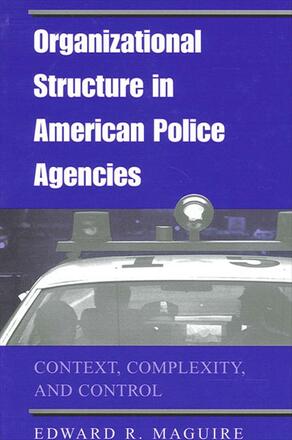
Organizational Structure in American Police Agencies
Context, Complexity, and Control
Alternative formats available from:
A new theory accounts for the characteristics of individual police departments.
Description
Although most large police organizations perform the same tasks, there is tremendous variation in how individual organizations are structured. To account for this variation, author Edward R. Maguire develops a new theory that attributes the formal structures of large municipal police agencies to the contexts in which they are embedded. This theory finds that the relevant features of an organization's context are its size, age, technology, and environment. Using a database representing nearly four hundred of the nation's largest municipal police agencies, Maguire develops empirical measures of police organizations and their contexts and then uses these measures in a series of structural equation models designed to test the theory. Ultimately, police organizations are shown to be like other types of organizations in many ways but are also shown to be unique in a number of respects.
Edward R. Maguire is Associate Professor of Administration of Justice at George Mason University.
Reviews
"This study represents a rare attempt to not only construct a theory about the factors that shape the structure of large American police agencies but also to test it. This is a refreshing departure from individual level theorizing about police. Maguire effectively weaves police and organizational literature in eloquently delineating a set of interrelated propositions about the context, complexity, and control among police organizations. " — Policing: An International Journal of Police Strategies & Management
"…extraordinarily detailed and comprehensive … Maguire brings great imagination to his discussion of methodology, measures, and concepts. " — Administrative Science Quarterly
"This book provides a great service by offering an intelligent, readable framework for understanding police organization structures and what shapes them. " — Stephen D. Mastrofski, coeditor of Thinking About Police: Contemporary Readings
"The theoretical model developed and tested by Maguire presents an interesting and insightful approach to the understanding of police agencies as complex organizations. " — Dennis R. Longmire, coeditor of Americans View Crime and Justice: A National Public Opinion Survey